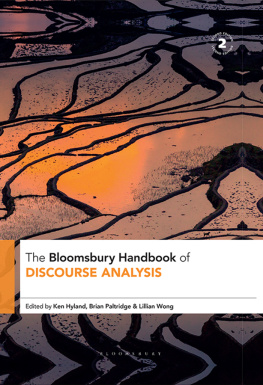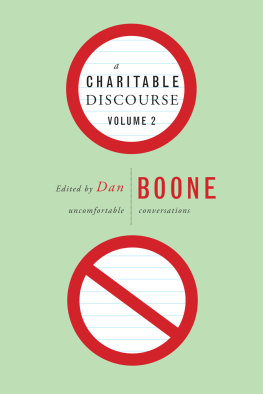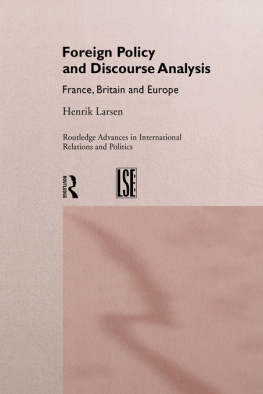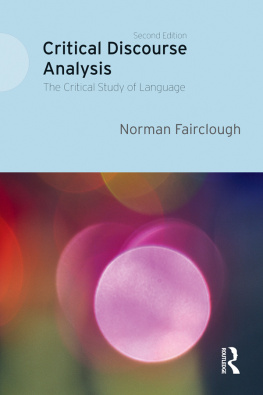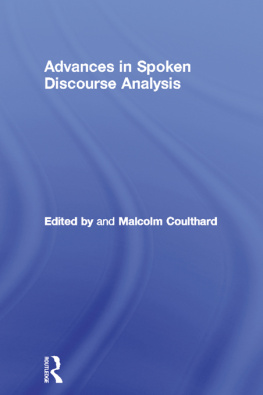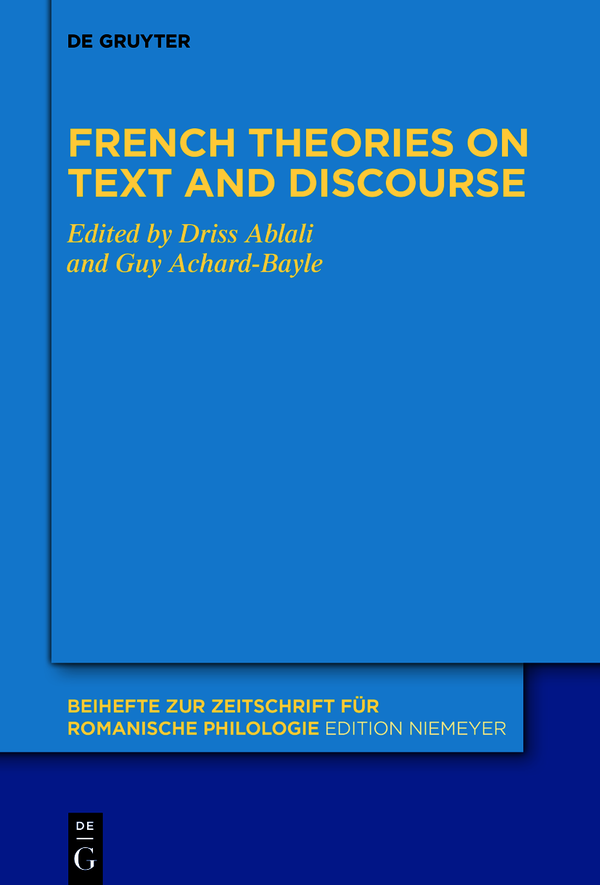Beihefte zur Zeitschrift fr romanische Philologie
Edited by
va Buchi
Claudia Polzin-Haumann
Elton Prifti
Wolfgang Schweickard
Volume
ISBN 9783110794335
e-ISBN (PDF) 9783110794434
e-ISBN (EPUB) 9783110794496
Bibliographic information published by the Deutsche Nationalbibliothek
The Deutsche Nationalbibliothek lists this publication in the Deutsche Nationalbibliografie; detailed bibliographic data are available on the Internet at http://dnb.dnb.de.
2023 Walter de Gruyter GmbH, Berlin/Boston
Introduction Language/speech vs. text/discourse: A family resemblance?
Driss Ablali
Universit de Lorraine, CREM
Guy Achard-Bayle
Universit de Lorraine, CREM
To begin with, we would like to recall the history of two duos which have endured in French linguistics for almost a century. In reality, these duos involve dichotomies: the first language/speech dominated theoretical and epistemological debates during the first half of the last century; the second text/discourse emerged only in the mid-1960s, and since then has been regarded as complementary.
Although Saussures Cours de linguistique gnrale ) to Saussure has taken place in the name of speech, and therefore of discourse.
Like all returns to Wittgenstein, Vygotsky, Bakhtin, Volochinov, or Benveniste , the return to Saussure has not been accomplished in an atmosphere of euphoria. The extraordinary history of the publication of Saussures texts on general linguistics continues to divide linguists. The gap is increasing between those who consider that major differences exist between the Saussure of the CGL and the Saussure who wrote the manuscripts ().
Once posited, the distinction becomes intriguing. Let us begin with this observation: the text/discourse duo appears nowhere in the CGL, where the word discourse occurs only four times, and then in its grammatical sense of part of discourse. In the WGL, discourse, which in Saussure and Benveniste maintains a relative ambiguity ( appears in plain language, but in different places within his manuscripts, where it is liable to assume a variety of conceptual constructions: might discourse, in these contexts, be interchangeable with speech, discursive order, or discursive language, as often happens in other of Saussures citations? By way of example, here is one taken from Course 1 (1907), where the substitution appears striking:
For a form to penetrate language, it is necessary 1. for someone to have improvised it and 2. improvised it during the course of speech, of discourse; and the same applies to all who have come across it subsequently. (
For as Arriv (1986, 53) rightly says, in [Saussure], there is a tendency to give different names to similar, or even identical concepts. ):
In many places, the Course in general linguistics proves to be problematic. The layout is substantially altered, the argumentation often abrupt, and the terminology apt to change. For example, replacements to the published Course can be seen, in students handwriting, where acoustic substance is replaced by phonic substance, acoustic figure by material sign, expression by linguistic complexus, and so on. The number of irregularities and glosses for which the Courses editors are responsible is breathtaking.
The famous note on discourse initially poses a crucial epistemological question, regarding the modalities of enunciation and exposition of scientific texts, and ). What, then, is discourse for Saussure? To what is it opposed? To phrase, text, language, or speech? How is it structured into a whole that deploys structures of an order that is different from that of the sign or syntactic unit? And under what conditions is it dealt with in the analysis? By separating it from the social conditions governing its production, in favor of an immanentist approach? Or rather by opening it up to the community as the necessary means of connecting language with society? These are complex questions, and can only be answered with confidence once the whole of Saussures corpus has been closely examined, because a concept does not necessarily correspond with naming and naming does not mean that the concept has been defined.
Let us summarize, therefore, in the wake of , who reminds us that discourse, as an effective manifestation, cannot, for Saussure, go beyond the limits of the syntactic unit. Fortunately, Saussure is sometimes very explicit about this:
This continuous between members of the group, which ensures the choice of a constituent at the moment of the discourse [...] at the moment when the syntactic construction is produced, the group of associations intervenes. (CLG, ed. Engler 1968, vol. 1., 2020 II C, cited by
This conception of discourse as limited to the syntactic construction is far from being a foundation for a linguistics of text and discourse; and ) adds this categorical conclusion:
This is perhaps why, from Course III onwards, Saussure was to abandon the term of discourse in this sense, replacing it with phrase structure: the word perhaps had too much of a tendency to slip towards the notion of speech.
As a result, in the well-known Note on discourse,
But although Saussure was a true pioneer of a discourse and discursivity theory, it is essential to answer the following questions, which are no more than posed here: what does the category of discourse become in the work of those who are currently returning to Saussures manuscripts? And on what empirical basis do these theoreticians of text and discourse rely, in order to support the notion that the objective of Saussures conception of discourse is to introduce conceptual tools with a view to apprehending and analyzing all discursive representation of meaning as it is inscribed in the linguistic material? More precisely, is Saussure now a linguist who theorizes the discursive as a way of apprehending language by drawing upon structures of another order than the sign? What we are trying to pinpoint with these questions concerns the common fund, both heuristic and epistemological, on which these theories of discourse and text in all their variety of usage rest; the purpose of this is to consider the notes in question, in the diversity of their discursive approach, with a discursive depth that goes beyond the syntactic construction. A beyond which another successor of Saussure has attacked, not by introducing discourse into the fold of the language/speech duo, but by making the text the fast track for accessing language.
This successor is none other than Hjelmslev, the founder of glossematics. But why refer to him here? The answer is clear: it is because Hjelmslevs innovative contribution, which was to have a strong impact on French semiotics, was causing linguistics to emerge from sign conversion and thus to break with the tradition of its time, which was much more preoccupied with sign analysis than with the text. Analysis should therefore begin not with signs but with the relationships they have with a scale, in a superior dimension, which Hjelmslev considers as text. Evidence of this can be found in these few extracts from Prolegomena, as well as elsewhere. This work was written in Danish in 1943, only three decades after Saussures death: Linguistic theory starts from the text as its datum and attempts to show the way to a self-consistent and exhaustive description of it through an analysis. (Hjelmslev 1943, transl. 1969, 21).
The text is therefore what is given, given to be seen and given to be analyzed, and whether it is written or oral is of no importance. Elsewhere, Hjelmslev (1973, 107) also says this: The object of the analysis is, of course, a text whether it exists graphically manifested in the form of a written message or acoustically manifested in the form of a oral message.


